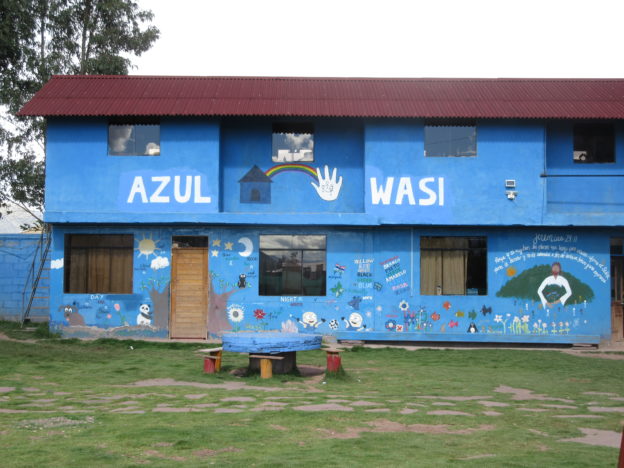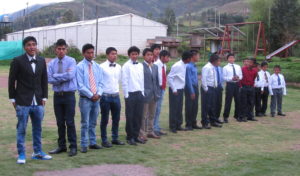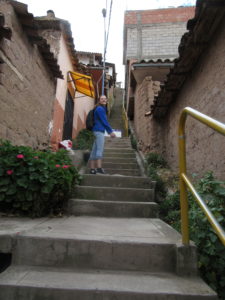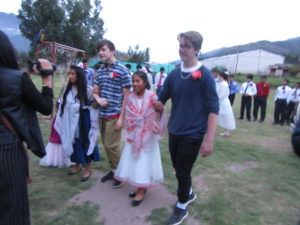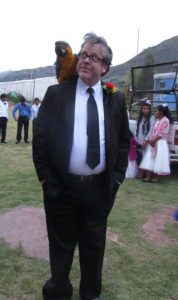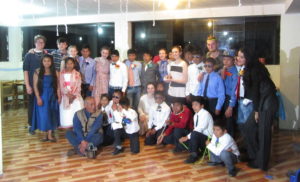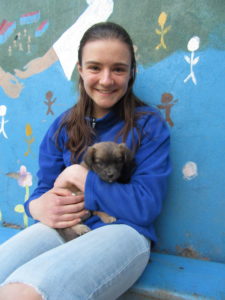
The house had the cutest set of puppies. Several members of the group were actively scheming on how to take them home.
Two of our afternoons and evenings here have been spent at Azul Wasi (“Azul” = blue in Spanish, and “Wasi” = house in Quechua — a descendent of the Inca language which is still spoken by many people in this area). This is a home for boys who were living alone on the streets, arrested for stealing food or other petty crimes. A police officer who was involved in their arrests decided to open a home for them. Now 17 boys, ranging from 8 or 9 up through university age, are living in here. Some of them have no memories of their parents, or any life before homelessness. Generations 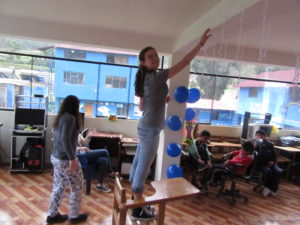 Humanitarian supports the home by undertaking construction projects and paying various expenses.
Humanitarian supports the home by undertaking construction projects and paying various expenses.
After greeting us upon arrival, the boys all introduced themselves and told us (with Van translating) what their ambitions for the future were. These ranged from mechanics, to tour guides, to scientists. The oldest boy, Dante, who has lived in the home since its inception, got the fifth highest score in the country on the national physics exam and is now attending university on a scholarship. It was touching to see how they had come to see themselves as a family, speaking of one another as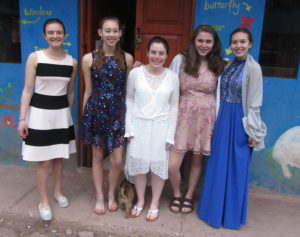 their “brothers”, and to hear the hopes that these formerly homeless boys now held for their futures.
their “brothers”, and to hear the hopes that these formerly homeless boys now held for their futures.
Our first day involved replacing a garden fence, working on a roof, and doing some painting. I was on garden fence duty, and we saw firsthand how in a place like this, you can’t just run out to Home Depot for tools to make the job simple — instead, you figure out how to make do with what you have. In this case, it meant using large needles and plastic “thread” to sew the fence panels to the fence posts, because we didn’t have a staple gun. (In the end we managed it, though our work was almost destroyed by a rogue sheep who got trapped inside and tried to barrel through our new fence. A few of the kids had to herd the sheep to the new opening at the other end of the potato field.) When we finished, some of the other moms used the remaining plastic to attempt to repair the boys’ soccer net.
On the second day, we’d planned a special surprise — a “prom” celebration. Christine had brought button-down shirts and bow ties for all the boys, plus fancy dresses for the three girls who lived there (daughters of the cook). Tiffany made beautiful boutonnieres for them. We picked up a cake from a bakery and snacks and drinks, and spent the afternoon decorating the room where the prom would be held. The kids, led by Andrew, came up with a playlist of American and Spanish music.
Throughout all our efforts, the boys were curious and eager to help. Whenever they saw us starting to work on something — making the soccer net, hanging lights, blowing up balloons — they jumped right in and started to help us. (You can see in the photo of Zoe above how enthusiastic they were about taping balloons to the poles.) Some of the moms who were prepping food in the kitchens said that the boys came in to clean up and did a great job. (Their 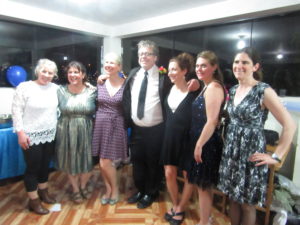 one downfall seemed to be in cleaning the bathroom, though this only seemed to bother the moms in the group.)
one downfall seemed to be in cleaning the bathroom, though this only seemed to bother the moms in the group.)
When the time came, things were a little awkward at first. The boys, as well as most of the kids in our group, were a little shy. A French college student who was staying at Azul Wasi as a volunteer was a great help, proving to be an excellent dancer and prodding the boys to join in. Eventually everyone relaxed and it seemed that a great time was had by all.

